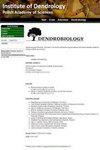Genome-wide association study of terpenoids in resin reveals candidate genes for resin yield in Pinus massoniana
IF 1.8
4区 农林科学
Q2 FORESTRY
引用次数: 2
Abstract
Masson pine (Pinus massoniana) is an important species for resin tapping in China. Molecular assisted selection (MAS) has been gradually introduced in to the selection and breeding of masson pine. Until now, the lack of connection between genome information and phenotypic data has hindered the breeding and selection of important chemical compounds of xylem resin. In this study, gas chromatography mass spectrometer (GC-MS) was employed for qualitative and quantitative analysis of chemical compounds of resin collected from 69 masson pine germplasm resources. Then, genome-wide association study (GWAS) was conducted for the terpenoids with higher heritability. A total of 15 primary compounds, including six diterpenes and nine monoterpenes/sesquiterpenes, were detected from xylem resin. By using five GWAS methods, 42 associated SNPs were identified from these masson pines. The P. taeda genome database was used for detecting candidate genes related to the associated SNPs. By using transcriptome data, several members of PKc_like super family, Cytochrome P450, AP2-EFR, F-box, and ABC transporter were found to be highly expressed in the masson pines with higher resin-yielding capacity. The terpenoids associated SNPs can be directly used for MAS. These candidate genes, especially the two F-box members, will contribute to the study of terpenoid biosynthesis mechanisms in the future.马尾松树脂中萜类化合物的全基因组关联研究揭示马尾松树脂产量的候选基因
马尾松(Pinus massoniana)是中国重要的树脂采伐树种。分子辅助选择(MAS)已逐渐引入到马尾松的选育中。到目前为止,基因组信息与表型数据之间缺乏联系,阻碍了木质部树脂重要化合物的育种和选择。本研究采用气相色谱-质谱联用技术对69种马尾松种质资源中树脂的化学成分进行了定性和定量分析。然后对遗传力较高的萜类进行全基因组关联研究(GWAS)。从木质部树脂中共检出15种主要化合物,包括6种二萜和9种单萜/倍半萜。通过5种GWAS方法,从马尾松中鉴定出42个相关snp。利用taeda基因组数据库检测相关snp的候选基因。通过转录组数据,发现PKc_like超家族的几个成员、细胞色素P450、AP2-EFR、F-box和ABC转运蛋白在具有较高产脂能力的马尾松中高表达。萜类化合物相关的snp可直接用于MAS。这些候选基因,特别是两个F-box成员,将有助于未来萜类生物合成机制的研究。
本文章由计算机程序翻译,如有差异,请以英文原文为准。
求助全文
约1分钟内获得全文
求助全文
来源期刊

Dendrobiology
农林科学-林学
CiteScore
2.20
自引率
11.10%
发文量
17
审稿时长
>12 weeks
期刊介绍:
Dendrobiology publishes original research articles and review articles related to the biology of trees and shrubs.
 求助内容:
求助内容: 应助结果提醒方式:
应助结果提醒方式:


